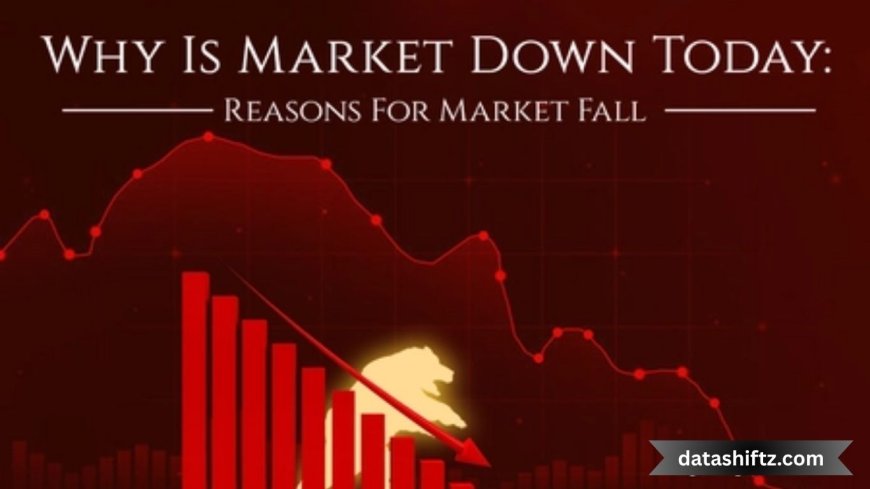Why the Market Is Down Today: Understanding the Causes and Implications

The stock market is a complex system influenced by a multitude of factors, and when it experiences a downturn, investors and analysts alike scramble to understand the underlying causes. Today, the market is down, leaving many asking: Why is this happening? In this blog post, we will explore the key reasons behind today’s market decline, analyze the contributing factors, and provide insight into what this means for investors moving forward.
What Is Causing Today’s Market Decline?
Market fluctuations are normal, but sharp drops often occur due to a combination of economic data, geopolitical events, corporate earnings reports, and investor sentiment. Today’s downturn can be attributed primarily to the following factors:
1. Economic Indicators and Data
Recent economic reports have shown signs of slowing growth in key sectors, alarming investors. Inflation data remains stubbornly high, prompting concerns about the Federal Reserve's next moves. Higher interest rates mean higher borrowing costs for companies and consumers alike, which can slow economic activity.
2. Corporate Earnings Disappointments
Several major companies released earnings reports that fell short of expectations. Disappointing revenue and profit figures suggest that some industries are facing challenges, including supply chain disruptions and rising input costs.
3. Geopolitical Tensions
Heightened geopolitical risks, such as conflicts, trade disputes, or sanctions, tend to increase uncertainty in the markets. Investors often react negatively to such uncertainty by selling off stocks to reduce exposure to risk.
4. Investor Sentiment and Market Psychology
Markets are heavily influenced by the collective mood of investors. Fear, uncertainty, and negative news can lead to panic selling or a more cautious approach, exacerbating market declines.
Factors in Detail: Why Is the Market Down Today?
Let’s take a closer look at the main contributors to the market decline in a structured way.
| Factor | Description | Impact on Market |
|---|---|---|
| Inflation Data | Inflation remains above target, pressuring consumer spending | Negative: Raises concerns about Fed tightening |
| Federal Reserve Policy | Indications of more aggressive interest rate hikes | Negative: Increases borrowing costs |
| Corporate Earnings | Missed revenue and profit forecasts from key companies | Negative: Signals potential economic slowdown |
| Geopolitical Risks | Rising tensions in global hotspots and trade negotiations | Negative: Increases market uncertainty |
| Market Sentiment | Investor fear and risk aversion | Negative: Triggers sell-offs |
The Role of Inflation and Federal Reserve Policy
Inflation is a primary concern for markets today. When inflation stays high, central banks, particularly the Federal Reserve, often respond by raising interest rates to cool the economy. While this is intended to keep inflation in check, it also makes borrowing more expensive for businesses and consumers.
This results in:
-
Reduced corporate investment.
-
Lower consumer spending.
-
Pressure on profit margins.
Investors fear that aggressive rate hikes might push the economy toward a recession, leading to a sell-off in equities.
Impact of Corporate Earnings Reports
Corporate earnings season acts as a reality check for the market. When earnings reports from large companies reveal lower-than-expected profits or revenues, it signals potential trouble ahead.
Common issues cited in today’s disappointing earnings include:
-
Supply chain bottlenecks increasing costs.
-
Labor shortages limiting productivity.
-
Declining demand in some sectors.
These factors reduce investor confidence in future growth prospects.
Geopolitical Tensions Amplify Uncertainty
Conflicts, sanctions, and trade disputes create uncertainty around global economic stability. Investors dislike uncertainty because it makes forecasting future returns difficult. As a result, riskier assets such as stocks tend to decline during geopolitical turmoil.
Recent developments have included:
-
Escalation in international conflicts.
-
Ongoing trade tensions between major economies.
-
Concerns about energy supply disruptions.
What Does This Mean for Investors?
A market downturn can be unsettling, but it also offers opportunities. Here’s what investors should keep in mind:
1. Stay Calm and Avoid Panic Selling
Market volatility is normal. Reacting impulsively to short-term declines can lead to missed opportunities when the market rebounds.
2. Review and Diversify Your Portfolio
A well-diversified portfolio helps mitigate risks from any one sector or asset class underperforming.
3. Look for Quality Investments
Companies with strong balance sheets, stable earnings, and good management tend to weather downturns better.
4. Monitor Economic Indicators and Fed Announcements
Stay informed about key data releases and central bank policy updates to anticipate future market moves.
Summary: Why Is the Market Down Today?
In summary, today’s market decline is driven by a combination of persistent inflation, potential Federal Reserve tightening, disappointing corporate earnings, geopolitical uncertainties, and shifting investor sentiment. Understanding these factors helps investors make informed decisions and navigate market volatility more confidently.
Conclusion
Today's market downturn is the result of multiple intertwined factors, including persistent inflation, the potential for further interest rate hikes by the Federal Reserve, disappointing corporate earnings, and growing geopolitical tensions. These elements have created a climate of uncertainty and fear, leading investors to adopt a more risk-averse approach and triggering broad-based sell-offs.
While market declines can be unsettling, they are also a normal part of economic cycles. The key for investors is to stay informed, avoid emotional decision-making, and focus on long-term financial goals. Diversification, patience, and a clear understanding of market dynamics can help weather short-term volatility and uncover opportunities even during uncertain times.





























